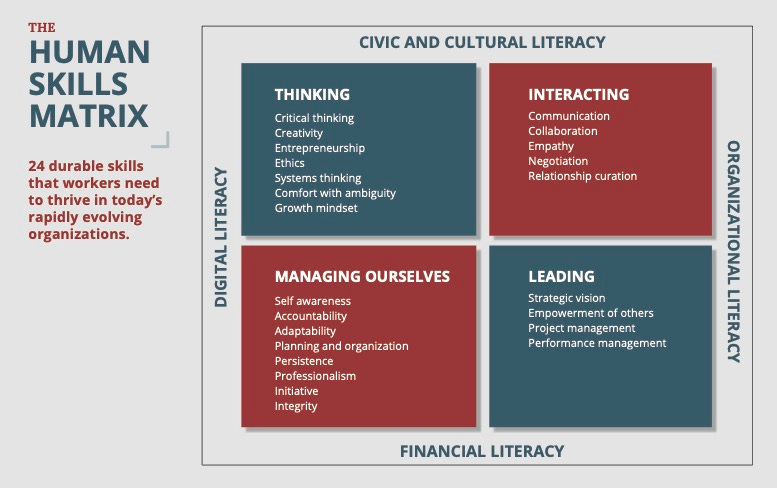Future-Proof Leadership: Safeguarding Your Human Skills
Strategies to Ensure Your Leadership Skills Stand the Test of Time
If you’re not a subscriber, here’s what you missed last month:
Click the button below to subscribe to receive these and and all future posts.
Future-Proof Leadership: Safeguarding Your Human Skills
The best leaders understand that the road to leadership is always under heavy construction. Learning to lead well is something that only the naive believe they don’t need to do. But knowing what to learn isn’t always clear. Occasionally, you’ll receive a gem of feedback that will point you in the right direction. And you’ll likely identify certain skills that you know you need to work on.
In my work as a Mentor for MIT’s Emerging Talent Programme, I’ve become familiar with the Human Skills Matrix (HSX), an MIT framework that identifies and classifies key skills for today's work environment. While not specific to leadership, it captures the non-technical skills that facilitate rapid learning and adaptability across all industries. And although intended for the STEM industry, it is applicable irrespective of the field.
The HSX quantifies the critical skills and attributes that individuals will need in the rapidly changing workplace of the future. Technical skills will continue to change and become redundant at a rapid pace, while non-technical skills and attributes, immune from machine replacement for the longest, will equip humans to thrive.
Developed by examining 41 existing frameworks from multiple sectors, MIT researchers identified the most sought-after skills across all. The resulting top 24 skills make up a matrix of how we think, how we manage ourselves, how we interact, and how we lead.
Some of these skills will come naturally to you, while others will require more effort. Some may even require intentional refreshing, even if they feel familiar.
Being intentional with your learning is critical. Having an objective or plan will ensure that the small steps you take cumulatively lead you in the desired direction and help you become the leader you aspire to be.
As I’ve been reviewing this matrix, as with all mentorship relationships, it prompted self-reflection and the opportunity to audit my own skills.
This week, I’d like to invite you to do the same.
With that in mind, here are four prompts to help you give your human skills an audit and focus.
If you find this weeks post helpful hit the ❤️ button at the top of this email so that more leaders can find it.
Reflect: Take a moment and reflect on each of the 24 skills.
Where would currently you rate yourself on a scale of 1-10 against each?
Which are in my comfort zone and which are well outside of it?
Which have you actively invested in working on and honing over the last 12 months?
Seek: What would your team and stakeholders say if asked to rate you against each of the 24 skills?
The more senior and experienced you get, the more entrenched and invisible your leadership traits can become. Understanding your blind spots and honing your skills is critical. And there are things that others will see that you will not.
Feedback from those you work with will help you test out your assumptions, and act as a benchmark for future comparison. Use the matrix above to guide your inquiry and use the tools below to get feedback to guide you. ⤵️
Identify: Think about your current world and role.
Of the 24 skills which does your current role require you to use the most, and which the least?
Which fill you with energy and which leave you feeling drained?
What could be driving that?
Plan: Think forward and look ahead.
What do you need to invest in over the next period to achieve what matters most?
Of the 24 skills which will your next big opportunity require you to develop more of?
Where are you most at risk?
Know another leader who loves to learn? The best way you can support Spark and Rebecca is to share it with a friend ⤵️








